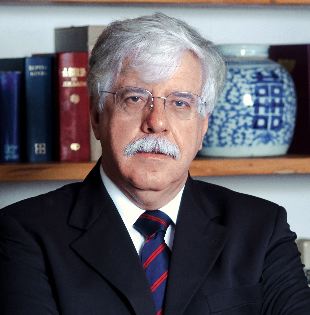The Waste Land
Um comentário bem feito sobre o poema.RR

Το ποίημα του T.S.Eliot The Waste Land αρχίζει με μια παράξενη επιγραφή στα λατινικά και αρχαία ελληνικά:
Nam Sibyllam quidem Cumis ego ipse oculis meis vidi in ampulla pendere, et cum illi pueri dicerent:
Σίβυλλα, τί θέλεις; respondebat illa: αποθανείν θέλω…
Αρχικά μου φάνηκε παράδοξο ότι ο Έλιοτ επέλεξε ως επιγραφή για την Έρημη Χώρα ένα απόσπασμα από ένα έργο με ύφος πολύ διαφορετικό. Το Σατυρικόν, από όπου και αυτό προέρχεται, είναι ένα έργο που γράφτηκε τον 1ο αιώνα μ.Χ. από τον αρχιτελετάρχη του Νέρωνα, Πετρώνιο. Το βιβλίο αφηγείται το ταξίδι δύο εραστών, του Εγκόλπιου και του Γείτονα, οι οποιοί περιηγούνται τη Μεσόγειο. Σκοπός του ταξιδιού είναι να βρεθεί μια θεραπεία στη σεξουαλική ανικανότητα του Εγκόλπιου. Μια ανικανότητα που επήλθε ως τιμωρία από τον θεό Πρίαπο, επειδή ο Εγκόλπιος παραβιάσε το άβατο μιας αυστηρά γυναικείας θρησκευτικής τελετής. Κάπου στη νότιο Ιταλία, λοιπόν, οι δυο ήρωες βρίσκονται προσκεκλημένοι στο σπίτι κάποιου Τριμάλχιου σε ένα πολυτελές συμπόσιο. Εκεί ανάμεσα σε άλλες κουβέντες μεθυσμένων ο Τριμάλχιος λέει τα εξής:
I actually went to Cumae and, with my own eyes, saw the Sibyl hanging up there in her glass case, and when the kids called out, „Sibyl, what would you like?“, she answered, „I’d like to be dead.“
(Petronius, Satyrica, 48)
Η κουβέντα αυτή δεν οδηγεί πουθενά, παρά μένει πραγματικά μετέωρη, κουβέντα ενός μεθυσμένου που δε συνδέεται με τα προηγούμενα ή τα επόμενα. Όμως έπειτα από την απαραίτητη αναζήτηση στο διαδίκτυο βρήκα το εξής διαφωτιστικό κείμενο της
Marianne Thormähle, University of Lund:
Most first-time readers who approach T. S. Eliot’s The Waste Land do so knowing that the poem is generally considered to be difficult, and the two epigraphs, or prefatory quotations, do nothing to dispel their apprehensions. Even at a first glance, the reader encounters difficulty: one of the quotations is in Latin and Greek, the other in mediaeval Italian. The first, “Nam Sibyllam quidem Cumis ego ipse oculis meis vidi in ampulla pendere …”, translates “For once I saw with my own eyes the Cumean Sibyl hanging in a jar, and when the boys asked the Sibyl, ‘what do you want?’ she answered ‘I want to die’.” This quotation from Petronius’s Satyricon, a racy prose narrative from the first century A.D. of which only fragments have survived, sets the tone for The Waste Land in more ways than one.
The Sibyl at Cumae was renowned for her enigmatic prophecies delivered on scattered leaves, which the recipient would have to try to organise into some sort of meaningful utterance. According to Ovid (Metamorphoses, 14, 132 ff), when she was young, Apollo had offered the Sibyl anything she wanted in order to win her favours, and in return she had asked Apollo for as many years of life as there are grains in a handful of sand, but forgot to ask for lasting youth as well. Hence a jar or bottle sufficed to hold her ancient shrunken body, and only death would release her from an intolerable and seemingly interminable life. Instead of being an awe-inspiring mediator of insights from the world of the gods, she was taunted by children. Finally, the source of the quotation is significant: it comes from a drunken boast by an unprepossessing representative of the idle rich in classical Rome. Petronius’ Satyricon is not only a tale of debauchery; it also deals with the pains of sex, homo- as well as heterosexual, especially impotence.
All these dimensions are present in Τhe Waste Land, a poem which characteristically resists attempts to extract a single message. Incorporating a wealth of fragments derived from other texts, it represents life as unbearable and frequently conflates life and death. So far as the religious dimension of human existence is in evidence at all, it is debased by shady practitioners of superstition, fraught with fear, or imbued by a sense of obligations neglected and opportunities missed. The civilisation that The Waste Land portrays is one in which the old values and loyalties have fallen apart. There is no sense of purpose in life: procreation is impeded, empathy non-existent, physical sensations dulled or skewed and sensual pleasure thwarted.
Εκτός από τη γενικότερη φιλολογική αξία αυτού του σχολιασμού, ιδιαίτερα ενδιαφέρουσα βρίσκω τη σύνδεση ανάμεσα σε ένα σοβαρό, αυστηρό κείμενο όπως η Έρημη Χώρα και σε μια κωμωδία της ακολασίας όπως το Σατυρικόν. Η Σίβυλλα κερδίζοντας την αιώνια ζωή αλλά ξεχνώντας να ζητήσει τα νιάτα, συρρικνώθηκε από τα γηρατειά σε μια μορφή που χωρά σε μικρό γυάλινο μπουκάλι. Μόνη και ξένη από όλους, περίγελος σχεδόν τον παιδιών. Χαζολόγημα για μεθυσμένους μπον βιβέρ, οι οποίοι όμως με τη σειρά τους βιώνουν την ανικανότητα για ζωή σε μια άλλη μορφή. Με την επιλογή αυτής της επιγραφής ο Έλιοτ τέμνει με έναν ευφυή τρόπο τον τραγικό μαρασμό της Σίβυλλας με την κωμική ανικανότητα των πρωταγωνιστών του ρωμαϊκού συμποσίου, η οποία ίσως τελικά να μην είναι απλώς σεξουαλική.
